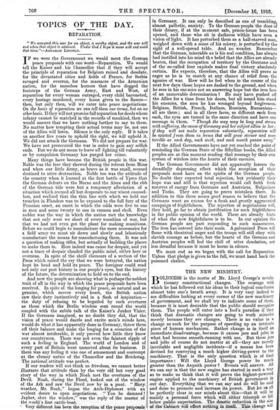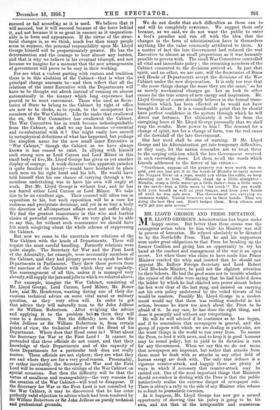THE NEW MINISTRY. B OLDNESS is the motto of Mr. Lloyd
George's revolu- tionary constructional changes. The courage with which he has followed out his ideas to their logical conclusion almost take one's breath away. It is very easy indeed to see difficulties lurking at every corner of the new machinery of government, and we shall try to indicate some of them, because it is most desirable that the public should recognize them. The people will enter into a fool's paradise if they think that dramatic changes are going to work miracles merely because they are changes. There is no value in a change as such for the purpose of speeding up an intricate piece of human mechanism. Rather change is in itself an immediate disadvantage, because it causes jars and jolts in what had become smooth-running with use. But these jars and jolts of course do not matter at all—they are merely inevitable and negligible incidents—if a means has been devised for conveying a much higher driving-power to the machinery. That is the only question which is of final importance : Will the Lloyd George power be much greater than the Asquith power ? Events will answer. All we can say is that the new engine has started in such a way as to make us think that it will prove the highest-powered engine applied to the machinery of British government in our day. Everything that we can say and do will be said and done to promote and increase its power. But let us all be perfectly clear in our minds about this—that • it will be mainly a personal force which will either triumph or fall below public expectation. The drastic reduction in the size of the Cabinet will effect nothing in itself. This change will succeed or fail according as it is used. We believe that it will succeed, but it will succeed because of the force behind it, and not because it is so great in essence as it unquestion- ably is in form and appearance. If the virtue of the struc- tural changes is, as we think, much less than many people seem to suppose, the personal responsibility upon Mr. Lloyd George himself will be proportionately greater. He has the determination and the courage to bear almost any burden, and that is why we believe in his eventual triumph, and not because we imagine for a moment that the new arrangements of government will prove to be easy in their working.
For see what a violent parting with custom and tradition there is in this abolition of the Cabinet—that is what the principal change amounts to—and then reflect that all the relations of the inner Executive with the Departments will have to be thought out afresh instead of running on almost automatically in the manner which long experience had proved to be most convenient. Those who used as Secre- tarieS of State to belong to the Cabinet by right of office are now to be clerks, so to speak, to the omnipotent five members of the War Cabinet. Like the snake that swallowed the ox, the War Committee has swallowed the Cabinet. The War Committee has in truth become indistinguishable from the Cabinet, or shall we say has become co-essential and co-substantial with it ? One might easily lose oneself in metaphysical definitions of what has happened, but perhaps the simplest name for the new small inner Executive is " War Cabinet," though the Cabinet as we have always known it has ceased to exist. In allying with himself such strong men as Lord Curzon and Lord Milner in this small body of five, Mr. Lloyd George has given us yet another display of courage. A weak dictator—this apparent paradox is quite familiar in history—would have hesitated to place such men on his right hand and his left. He would have told himself that his one chance of carrying through a tre- mendous undertaking was to have his own will singly at work. But Mr. Lloyd George is without fear, and he has not feared either Lord Curzon or Lord Milner. We take this to be an excellent sign. Their counsel will often run in opposition to his, but such opposition will be a cure for rashness and precipitate decisions, and yet in so tiny a body the direction of all-important affairs need not suffer delay. We find the greatest reassurance in this wise and fearless choice of powerful comrades. We are very glad to be able to say this, for without such reassurance we should have felt much misgiving about the whole scheme of suppressing the Cabinet.
But now we come to the uncertain new relations of the War Cabinet with the heads of Departments. These will require the most careful handling. Formerly relations were quite simple. The Secretary for War and the First Lord of the Admiralty, for example, were necessarily members of the Cabinet, and they had plenary powers to speak for their Departments in Parliament. They drew those powers from the sanction of the Cabinet with which they sat regularly. The rearrangement of all this, unless it is managed very cleverly,will supply the jars and jolts to which we referred above.
For example, imagine the War Cabinet, consisting of Mr. Lloyd George, Lord Curzon, Lord Milner, Mr. Bonar Law, and Mr. Henderson, wanting during one of their dis- cussions technical advice on some vital naval or military question, as they very often will. In order to get that advice they will naturally turn to Sir John Jellicoe or Sir William Robertson. After weighing the advice and applying it to the problem heft ie them they will come to a decision. But the difficulty here is that Sir John Jellicoe or Sir William Robertson is, from certain points of view, the technical adviser of the Head of his Department. Where does that Head come in ? What about the Secretary for War or the First Lord ? It cannot be pretended that these officials do not count, and that their knowledge of their Departments and of the capacity of those Departments for a particular task does not really matter. These officials are not ciphers; they are what they are and where they are for a very good reason. Presumably, or rather inevitably, the Secretary for War and the First Lord will be summoned to the sittings of the War Cabinet on special occasions. But then the difficulty will be that the virtue of smallness and manageability—the very reasons for the creation of the War Cabinet—will tend to disappear. If the Secretary for War or the First Lord is not consulted by the War Cabinet, it may be discovered that he has some perfectly valid objection to advice which had been tendered.by Sir William Robertson or Sir John Jellicoe on purely technical and professional grounds. We do not doubt that such difficulties as these can be and will be completely overcome. We suggest them only because, as we said, we do not want the public to enter a fool's paradise and run off with the idea that the changes in the form of administration have in themselves anything like the value commonly attributed to them. As a matter of fact the late Government had reduced the real Executive to almost as small proportions as it was humanly possible to govern with. The small War Committee controlled all vital and immediate policy ; the remaining members of the Cabinet consented to the decisions arrived at. In just that spirit, and no other, we are sure, will the Secretaries of State and Heads of Departments accept the decisions of the War Cabinet under the new dispensation. It is only too true that " the more things change the more they are the same," so far as merely mechanical changes go. Let us look to other causes for the true source of new energy and inspiration. Mr. Lloyd George of course devoutly believes in the formal trans- formation which has been effected or he would not have brought it about. It is a considerable point that he should have perfect confidence in the system through which he will direct our fortunes. For ultimately it will be from the energizing force of Mr. Lloyd George personally that we shall reap the results. More power to him I The demand for a change of spirit, not for a change of form, was the real cause of the downfall of the late Government.
Our last word shall be one of warning. If Mr. Lloyd George and his Administration get into temporary difficulties, as they may, let the nation remember not to treat them to the carping criticism which the late Government received in such enervating doses. Let them recall the words which Lincoln addressed to the fiercer of his critics:—
"Gentlemen, suppose all the property you were worth was in gold, and you had put it in the hands of Blondin to carry across the Niagara River on a rope, would you shake the cable, or keep shouting out to him, "Blondin, stand up a little straighter- Blondin, stoop a little more—go a little faster—lean a little more to the north—lean a little more to the south 'F No, you would hold your breath as well as your tongue, and keep your hands off until he was safe over. The. Government are carrying an immense weight. Untold treasures are in their hands. They are doing the best they can. Don't badger them. Keep silence, and we'll get you safe across."



































 Previous page
Previous page